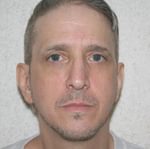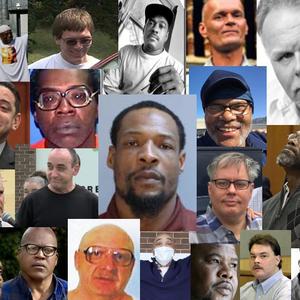
Oklahoma has pushed back the clemency hearings of two men on death row, John Hanson and Richard Glossip (pictured). Glossip’s execution date was also moved back, and Hanson’s execution date will likely have to be changed. Both men were scheduled to have clemency hearings on Nov. 9, 2022, and to be executed before the end of the year, as part of Oklahoma’s planned spree of 25 executions scheduled between August 2022 and December 2024. The state’s decision to execute so many people in a short period meant that it set a tight schedule for clemency hearings and executions, and it remains unclear how these changes will affect the schedule of executions.
John Hanson was scheduled to be executed on December 15. However, Hanson is currently in custody at a federal prison, which has refused to transfer him to Oklahoma custody for the clemency hearing or the execution. The Federal Bureau of Prisons denied the transfer on the basis that it would not be in the public’s best interest. As of November 21, 2022, the state has not set a new clemency hearing date or execution date for Hanson.
Richard Glossip was scheduled to be executed on December 8, after his earlier execution date in September was stayed by Governor Kevin Stitt. His clemency hearing was pushed back after Stitt issued a second 60-day reprieve for Glossip’s December execution date on November 2nd. Stitt issued the reprieve so that the Oklahoma Court of Criminal Appeals (OCCA) could complete its review of Glossip’s petition for a hearing on new evidence of his innocence. The OCCA denied two petitions from Glossip on November 10 and 17.
In response to the OCCA’s November 17 denial, Glossip’s attorney, Don Knight, issued a statement, saying, “The only thing we asked for in our two petitions was a fair hearing on our newly discovered evidence that the jury never heard. We are extremely disappointed that instead of giving us this opportunity, the Court improperly assumed the role of factfinder, and closed off our opportunity to begin to right this tragic wrong. But our fight to free this innocent man will never end. It is now clear that the District Attorney’s office has been withholding exculpatory information from the Glossip defense team ever since the trial, and we know there is still more information they have not shown us. What are the authorities so afraid of? It is critical that a full review of all the evidence be conducted before the State of Oklahoma makes the irrevocable mistake of executing an innocent man.”
Glossip was sentenced to death after he was implicated in a murder for hire in 1997 and has consistently maintained his innocence for the past twenty-five years, arguing that the state’s case against him was flawed because it primarily relied on the testimony of the man who actually committed the murder, Justin Sneed; that the state worked with Sneed to feed him testimony and prevent him from recanting; and that the state subsequently withheld exculpatory evidence from Glossip’s team. Glossip claims that after Sneed was arrested for killing the victim, Barry Van Treese, he falsely implicated Glossip to avoid the death penalty himself.
In the petitions, Glossip raised claims that he was factually innocent and had new evidence to prove it, including new affidavits impeaching Sneed’s reliability and calling his testimony into question. This included testimony from someone who was incarcerated with Sneed who recalled him asking them to pretend they had overheard Glossip confess to the murders, and to come forward as an informant. Sneed ultimately agreed to a plea deal with the state, where he exchanged his testimony against Glossip for life in prison, rather than a death sentence. Glossip’s team also presented a note between Sneed’s attorney and the prosecutor, which they claimed demonstrated that the prosecution fed Sneed information for his testimony, and evidence that Sneed had talked about recanting his testimony multiple times over the years, a claim which Sneed had previously denied.
Another claim Glossip raised during his hearing was that the state’s bad faith destruction of evidence violated his right to due process. The prosecution’s theory of Glossip’s motive was that he was embezzling from Van Treese, because Glossip managed a motel owned by Van Treese. Glossip was originally convicted and sentenced to death in 1998, but his conviction was overturned in 2001 due to ineffective assistance of counsel, and he was retried in 2004. While he was still appealing his 1998 conviction, the prosecutor’s office ordered the destruction of Van Treese’s financial records, which were being held in evidence, against their official policy to preserve evidence in capital cases. Glossip claims that this evidence was potentially exculpatory because it could answer the question of whether anyone was embezzling from Van Treese, which was never directly proven.
Glossip also raised claims about the inefficacy of his own counsel’s investigation in his 2004 retrial, as they failed to conduct independent investigations into many aspects of the case, and that the state’s investigation failed to meet the demands of due process.
Rather than consider the merits of these claims, the OCCA by and large dismissed them on the basis that Glossip’s arguments were procedurally barred because he has or could have presented these arguments before this point. It did acknowledge that it can sidestep procedural bars when claims of factual innocence are presented but stated that Glossip’s claim does not necessitate such a step. In the November 17 denial, the court wrote, “None of his claims convince this Court that the alleged errors have resulted in a miscarriage of justice or constitute a substantial violation of a constitutional or statutory right.”
The OCCA did not find Glossip’s arguments convincing, but there has been a great deal of interest from various stakeholders in Glossip’s case. Oklahoma state legislators formed a bipartisan Ad-Hoc Legislative Committee, which urged the Oklahoma Governor and Pardon and Parole Board to launch new investigations into Glossip’s case. When those offices did not, the Legislative Committee requested that Reed Smith, LLP, an independent law firm, investigate Glossip’s case. The independent investigation’s final report is over 300 pages and determined that “fundamental concerns and new information revealed by this investigation cast grave doubt as to the integrity of Glossip’s murder conviction and death sentence.”
Glossip’s team released a statement that they will continue to fight to get a full review of all the evidence in Glossip’s case. Richard Glossip’s new execution date is February 16, 2023.
Kevin Severin, Clemency Hearings for Death Row Inmates John Hanson and Richard Glossip Postponed, Oklahoma City Fox, Nov. 8, 2022
Steve Almasy & Rebekah Riess, Appeals Court Denies Death Row Inmate Richard Glossip’s Request for Hearing on New Evidence, CNN, Nov. 10, 2022.
Read Glossip’s first petition and second petition to the OCCA for a new evidentiary hearing.
Read the OCCA’s denial of Glossip’s petition for a new evidentiary hearing here.
Read the independent investigatory report by Reed Smith, LLP here.
Upcoming Executions
Nov 21, 2024

Alabama is Set to Execute Carey Grayson in its Third Nitrogen Gas Execution in 2024
Innocence
Oct 23, 2024

